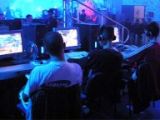The living basics: a healthy life and a healthy body. Affection, education, evolution, achievement, death. Parents, friends, school, lovers, job, children. Live and play. But "live in your world and play in ours", say the commercials.
When people think of having kids they imagine them walking, playing, living a healthy life, falling in love, having a career and having kids. When a man finds out he would be a father he can't stop but worrying how to get a better job, take care of the family and never miss the kid's baseball games or plays..
Sports have always been a part of the life and joy program. Starting as a hobby, going through a professional stage, a sport may sometimes become an addiction.
According to a generally accepted definition, a sport "consists of a normal physical activity or skill carried out under a publicly agreed set of rules, and with a recreational purpose: for competition, for self-enjoyment, to attain excellence, for the development of skill, or some combination of these. A sport has physical activity, side by side competition, and a scoring system. The difference of purpose is what characterizes sport, combined with the notion of individual (or team) skill or prowess".
Sports have become part of the popular culture through their professional representation. Sports make an industry. Sometimes they even become a way of life.
Who would have thought fifty years ago that sitting in front of the computer might become more than a research demand? Or that people will go from a 1962 computer game to worldwide electronic sports competitions?
The first computer game is believed to have been "Spacewar!" which was invented in 1962 by an MIT computer scientist named Steve Russell. The computer that powered the game was the size of a small car.
Now, computer games are not just hobbies or sports, but they can sometimes be useful in health care and research by effectively distracting players from the sensation of pain. They have been used as a form of physiotherapy or to help develop social and spatial ability skills in many different groups of people.
But let's talk about sport. If a father tried to come earlier from work an teach the kid some baseball skills, or encourage his sporting skills, now he can stay late at work and spend some money for videos or computer games, and support the kid in competitions, if he wants to go pro.
Gaming is a worldwide pastime enjoyed by those of all generations - from the time we are children until we are seated around a senior center table for bridge, gaming provides us with both fun and social interaction. It has only been a decade since computer gaming first hit the mainstream, but it is now really taking off.
In the computerized world we live in, we came to talk about a gaming frenzy. Electronic sports are an industrial reality.
If running a professional football or basketball team requires five to 10 billion dollars won, managing a professional gaming team needs a mere five hundred million to two billion dollars. Less money lead to bigger benefits.
Electronic Sports (or eSports) is used as a general term used to describe computer and video games which are played as sports. Some also use the terms of competitive gaming, cyber-sports and v-sports but the most popular among players are gaming and e-sports.
Games considered electronic sports are normally first-person shooter and real-time strategy games, which are played competitively at both amateur and professional stages.
Major championships and festival have become famous in the entire world.
Teenagers between 15 and 25 enlist into competitions, train themselves like athletes do, only that they become champions in a virtual world and stars in the real one. Their virtual world powers and computer skills may bring them money, fame and recognition. And where do they go from there? A model or an athlete may become part of a campaign, hero of a book or of a movie, an icon, sometimes a role model or a charity promoter. Would a gamer become more than a professional skilful player who managed to make some money promoting corporations? Things change faster in the virtual world. There always are new gamers, new strategies, sponsored by almost the same companies.
What Do You Play For a Living?
The major events Cyberathlete Professional League, Electronic Sports World Cup and the World Cyber Games, which offers an Olympic approach and a Professional Amateur category have become famous in the entire world.
CPL (launched in 1997) is a computer games league that had hosted live tournaments on five continents, 45 international main events with a total attendance of 50,000 gamers and has awarded $3,000,000 in prizes. The CPL also operates an online-only league for amateur players and teams, known as the Cyberathlete Amateur League. CAL operates year-round, with regular 8-week seasons, one or two matches per week, and a single-elimination postseason.
The competitions have earned the attention of the media and were covered by MTV, CNN, ESPN, USA Network, WB, GSN, Fox, Nickelodeon, G4, TechTV and ABC World News Tonight.
Games included in the competition are: Alien vs. Predator 2, Call of Duty , Counter-Strike, Counter-Strike: Source , Day of Defeat, Descent III, Doom 3, Grand Prix 4, Serious Sam and Scrabble, Halo PC, Halo 2, Midtown Madness 2, Painkiller, Quake I, Quake II, Quake II Female, Quake III, Quake III Female, Quake III Team Deathmatch, Team Fortress Classic, Unreal Tournament 2003, Unreal Tournament 2004 and Warcraft III.
For the World Tour Grand Finals, scheduled for the end of this years in New York City, 32 players from across the globe will compete live for a prize of $500,000.
The CPL Winter 2005 Event will take place Wednesday, December 14 to Sunday, December 18, 2005 at the Hyatt Regency, in Dallas, Texas. The organizers' intention is to design the event more like a mega LAN party than a pro-gaming event, which will be televised.
Eight years ago, Total Entertainment Network has announced the formation of the PGL, a professional sports league for computer gamers. It's declared aim was to line the pockets of the top players and turn online gaming into a recognized sport.
According to the PGL co-founder Joe Perez, the objective of the league was to standardize the currently fragmented realm of competitive gaming, give gaming a mass audience year-round, and create a recognizable "elite" of star players. "We want to give gamers a common place to come for scores - the one place to go for bragging rights. (?) There's too many different tournaments, and there's no one central place where people can focus their time", Perez said.
In 2000, Gamers.com has acquired Professional Gamers' League and announced a strategic alliance with AltaVista Network
The PGL follows the model of the leagues like the tennis circuit or the PGA. Any gamer can join the league, but only the top 128 players in each game category (which are Quake and Red Alert for the first season) qualify for the quarterly championships. The competitions get media coverage, are broadcast on the Web, scored and ranked by a complex system based on chess championships. The well-known league has set up an advisory board of gaming-industry VPs, and some of the best-known gamers on the Net are offering input on ranking, officiating, and qualification rules.
Europe has also stepped into the gaming system. ESL, the Electronic Sports League also covers every form of competition, tournaments or ladders. The ESL have opened the signups for the International Counter-Strike 5on5 MR15 Amateur Series, as well.
Electronic Sports World Cup is a sporting project conceived, produced and managed by a European company of events production, communication and computing development, specialized in video games and electronic sports: Ligarena, that supervises the international Electronic Sports World Cup preliminaries and directly produces the qualifiers in France and the Grand Final.
The official ESWC disciplines are: Counter-Strike, Warcraft III - TFT, Pro Evolution Soccer 4, CS Women, Quake III Arena, UT2K4, Gran Turismo 4.
But the most famous is the largest gaming festival known as The World Cyber Games (WCG), an international e-sports event operated by Korean company International Cyber Marketing and backed by Samsung.
The World Cyber Games, influenced by the Olympic Games with a players village for competitors, were set up in 2000 with the first festival being held in 2001. Since 2004, the organizers have been searching a different host city every year
Each participating country conducts preliminary rounds before sending the finest gamers to represent them in this major event. At the beginning of October 2004, almost 600 gamers from over 60 countries gathered in San Francisco for a prize worth $400,000 and challenged in FIFA Soccer 2004, Need For Speed: Underground, StarCraft: Brood War, Unreal Tournament 2004, Warcraft III: The Frozen Throne, Halo and Project Gotham Racing 2.
This year, 800 players will enlist for the Singapore festival for battles in Counter-Strike: Source, FIFA Soccer 2005, Need For Speed: Underground 2, StarCraft: Brood War, Warcraft III: The Frozen Throne, Warhammer 40,000: Dawn of War, Dead or Alive Ultimate, and Halo 2.
The WCG 2006 will be hosted in Monza, Italy.
A top professional gamer enlisted in competitions and engaged in a sponsorship program can make nearly $500,000 US per year. European and American players seem to follow the trend of the Asian players. At the moment, probably the most gamer-dense nation in the world is Korea. Professional gamers in Korea make above average salaries for what young Koreans make, and are really famous depending how good they are.
If almost every Korean young man has spent at least a few dozen hours playing Starcraft, they all have the vocabulary to talk about it, their favorite race, and they can enjoy themselves watching masters of the sport play. Players can often enjoy a near-cult status not just with their in-game counterparts, but nationally as well as across the globe.
But this is the land of excessive gaming, as well.
Another South Korean gamer has died this week, this latest excessive-gaming death coming after a fifty-hour StarCraft session in an internet caf? in the city of Taegu.
The 28-year-old man known as "Lee", who had lost his job after skipping work to play videogames, reportedly died of heart failure induced by exhaustion.
According to online gaming expert Psychologist Professor Mark Griffiths, "online gaming addiction for a small minority is a real phenomenon and people suffer the same symptoms as traditional addictions. They are the types of games that completely engross the player. They are not games that you can play for 20 minutes and stop. If you are going to take it seriously, you have to spend time doing it"
Almost 30% of the entire South Korean population are registered online games players, a staggering proportion given the infancy of the hobby in other nations.
Lee's death is a tragic example of the increasing appeal of synthetic worlds.
The world inside the game is much more different than the world outside the game, and it will be designed to be more attractive.
A professional gamer fights in the virtual world, but doesn't forget to train, live and be famous in the real world.
It seems like games do make people battle their own demons and offer and escape. Than it's all about lucidity, training, maturity
But more important it's about not forgetting it's all about a game.
Should we think about redesigning the real world so that people don't risk their own health just to get out of it?

 14 DAY TRIAL //
14 DAY TRIAL // 



